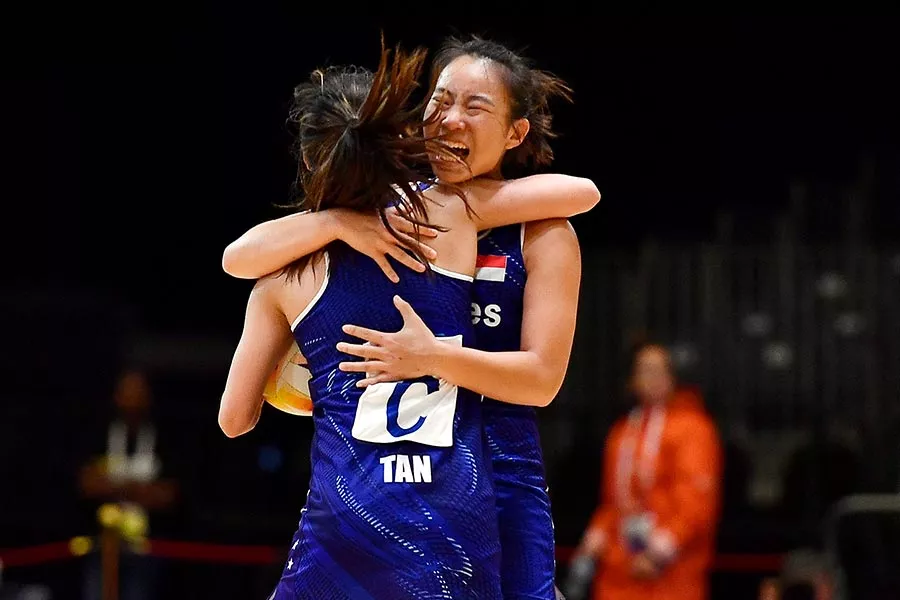By Linda Pearce
Once upon a netball court, typically the outdoor asphalt kind in the early years, two countries reliably dominated the pinnacle netball event known variously over its 16 eventful editions as the World Tournament, then Championships, now Cup.
Last century, the only exceptions to an Australia-New Zealand quinella were cameos from Trinidad and Tobago (through a three-way tie in Port-of-Spain in 1979), England (surprise runners-up after toppling the hosts in Auckland in 1975), and South Africa (unexpected 1995 silver medallists in Birmingham).
Then, in the 2000s, along came England to grab the 2023 silver behind the Origin Diamonds in Cape Town; the Roses having previously snared a dramatic gold medal at the 2018 Commonwealth Games on Australia’s turf, the Gold Coast, in one of the most seismic results in the sport’s history.
With the Silver Ferns knocked off the podium altogether at the 2023 World Cup, and the talent-laden but underachieving Jamaicans stretching to eight their tally of minor international medals with a best-ever silver at the 2022 Comm Games, the top four remains tightly bunched on the runway to Sydney, 2027.
Where the final will be played exactly two years from today, September 5th.
With improving depth and growth among the next tier of nations and expanding into new markets both key ambitions, netball continues to build its global credentials and extend a footprint stretching beyond its traditional Australasian stronghold.
One which already encompasses 20 million participants in more than 80 countries on five continents.
A compelling subplot is that, as Australia ramps up preparations for its fourth-ever World Cup hosting, and third in Sydney, the grand ambition of inclusion in the 2032 Brisbane Olympic Games is gaining powerful momentum.
Netball's global credentials are growing. The fact the world is increasingly taking notice is evidenced by the signing of two landmark deals across broadcast and digital platforms for world-leading Suncorp Super Netball in recent months.
One is with Whoopi Goldberg’s All Women’s Sports Network (AWSN), which reaches 900 million households worldwide; the other with global content distributor Inverleigh to stream SSN and Australian Diamonds matches live and free across the US, Canada and Africa via its 24/7 linear sports channel UNBEATEN, which has a reach of 300 million active users.
Yet while numbers are important, so is the less quantifiable impact of female-focused empowerment and wellbeing benefits across the regions, from Asia (Sri Lanka, Singapore and Malaysia head the local rankings) and the Pacific (see 9th-ranked Tonga, plus Samoa and Fiji, particularly) to Africa (with seven countries in the top 20, headed by South Africa at No.5).
“The talent pool (in Africa) is huge. They can produce fantastic athletes,’’ says former Australian captain and coach Norma Plummer, who led the plucky Proteas in two stints from 2015-23.
So competition, just like momentum and profile, is building, as the “two years to go” shingle is metaphorically hoisted outside Qudos Bank Arena, where the world attendance record for a netball game of 16,752 was set for the 2015 NWC final between - OK, yes - the usual suspects.
“Jamaica, England, South Africa, they’re threatening, and you’d have to add Uganda and Malawi in there,’’ says former Australian captain Vicki Wilson, a former head coach of Fiji and ex-Silver Ferns assistant.
Adds Plummer: “England beat New Zealand last year, they also took a game off Australia, so they’re right up there, and Jamaica should have won a World Cup by now purely for the athleticism of the players, but they still just haven’t been able to finish off.’’
Yet Jamaica has, since Trinidad and Tobago’s decline from the Jean Pierre-assisted powerhouse of the 70s/80s, been the Caribbean benchmark - most recently with a squad full of SSN-based athletes bookended by West Coast Fever colossus Jhaniele Fowler-Nembhard and Adelaide Thunderbirds superstar Shamera Sterling-Humphrey.
Teams such as Jamaica and South Africa will be real threats in 2027.“When they come into SSN they come into the daily training environment, and they become far more professional in their performance behaviours, and it raises the performance standards,’’ says Wilson, the 104-Test shooting great.
“So that’s the benefit internationally: that those players who are here go back to their national team with that knowledge of what it takes to be successful and to compete in a tough environment, week in, week out.’’
And not just from Suncorp Super Netball, but also the UK Superleague and New Zealand’s ANZ Premiership, which not only provide players with professional pathways but also give fans across the globe regular access to world-class netball, expanding the sport’s audience and brand.
Bums on seats matter too, though, and Australia’s first World Cup hosting duties were in Perth in 1967, in the event’s second edition. Wilson was part of the groundbreaking 1991 success, and in assistant coach mode at Sydney Olympic Park in 2015 for the Silver Ferns.
Indeed, the 60-year-old triple world champion was caught slightly off-guard when told that it is just two years now until the next, biggest, and most internationally significant yet.
One that would potentially be a dress rehearsal of sorts for the sport’s longed-for Olympic breakthrough in her home city of Brisbane.
“It would be huge, it would get a lot of eyeballs on the game which haven’t seen it before and without a doubt it would be a sellout, just like every other Olympic event,’’ Wilson says.
“People would just flock to it, so it would be spectacular, that’s for sure.’’
